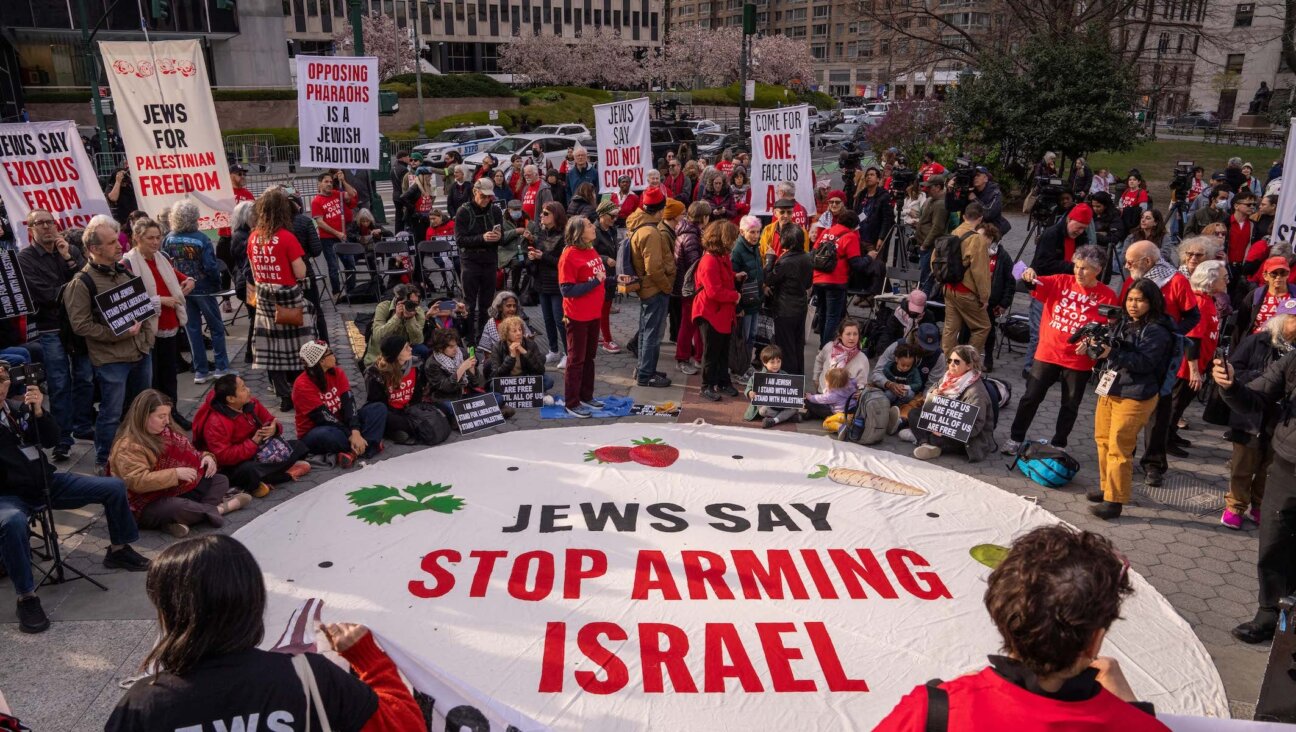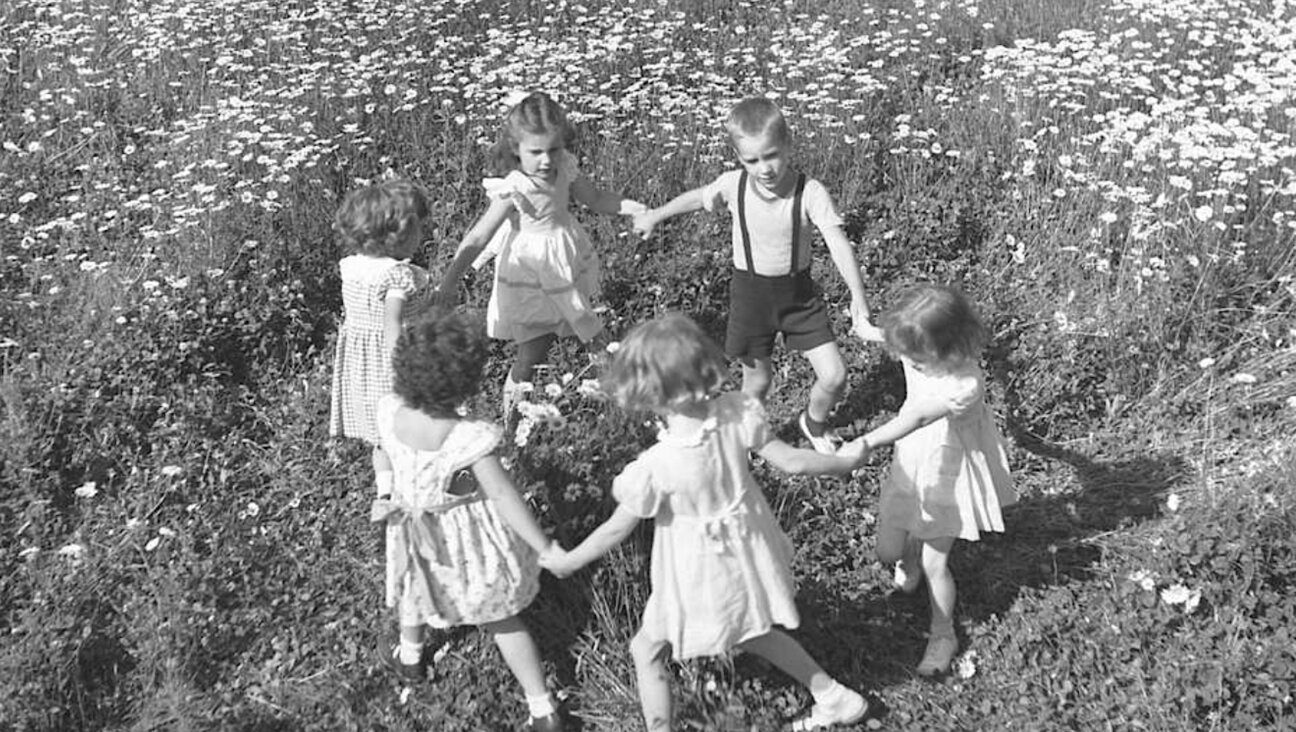‘An impact on the world’: Brown University hunger strikers, one Jewish and one Palestinian, on their war protest
Ariela Rosenzweig and Nour Abaherah are among 19 Brown students engaged in a hunger strike to demand the university take a stronger line on Israel
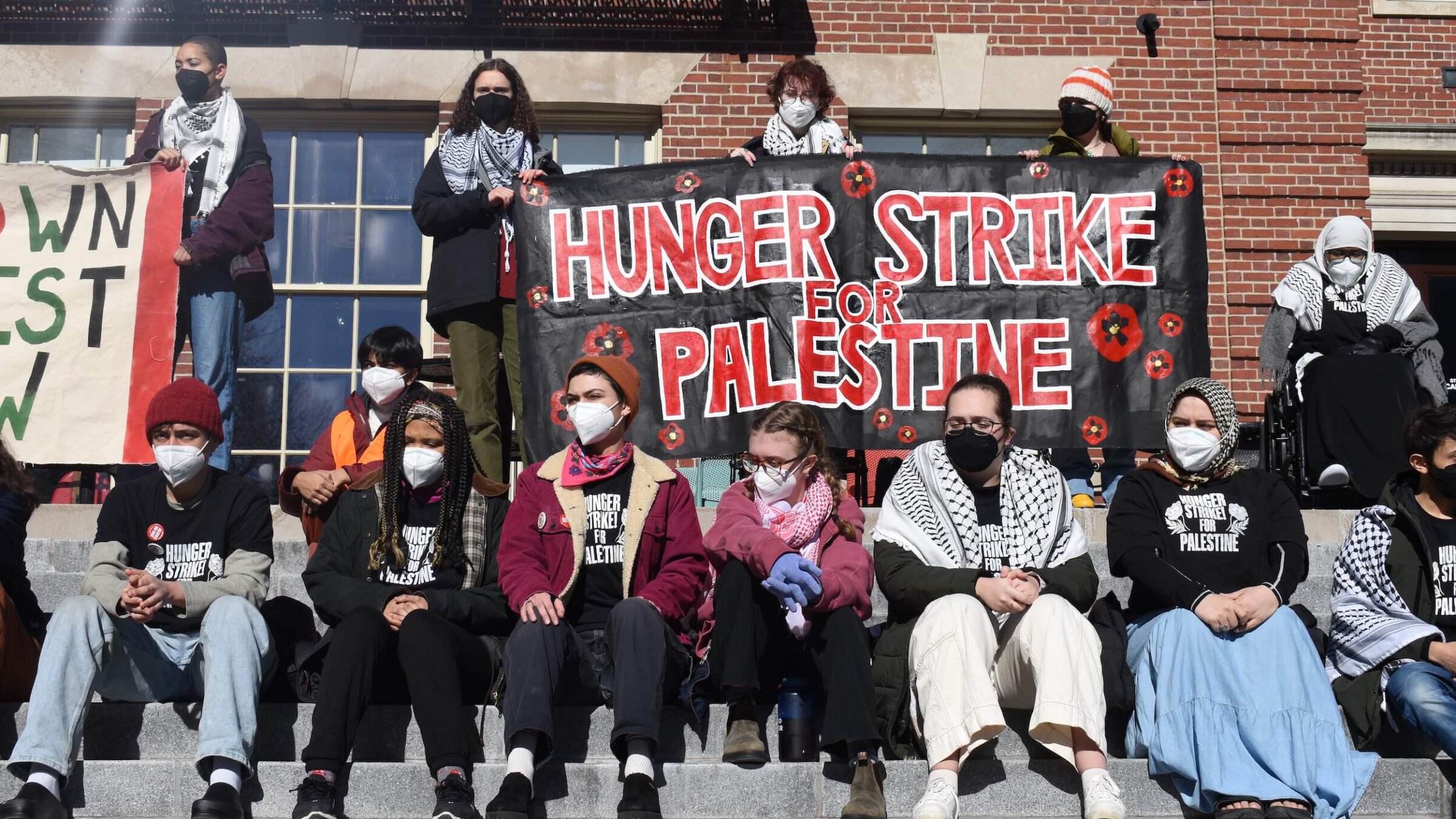
19 Brown University students embarked on a hunger strike late last week, demanding that the university’s administration consider divesting from its Israel-affiliated assets. Photo by Alicia Joo
Nineteen Brown University students are on a hunger strike in protest of the university’s policies when it comes to Israel — the most significant such American protest since the Israel-Hamas war broke out nearly four months ago.
It’s the latest instance of activism against the war on Brown’s campus. On Nov. 8, 20 members of Jews for Ceasefire Now, including Ariela Rosenzweig, a senior, were arrested on campus. The group demanded that Brown “promote a permanent ceasefire by divesting from companies that facilitate the genocide in Gaza.”
In December, 41 students were arrested after protesting in pursuit of the same goal under the banner of “Divest for Hisham,” after Brown junior Hisham Awartani, a Palestinian American, was shot and paralyzed in Vermont in what is being investigated as a hate crime.
The hunger strikers, who began their protest on Friday, aim to ensure that the university “hears and considers a divestment resolution” during meetings with the Corporation of Brown University — the university’s governing body — this week. They say they are asking university president Christina Paxson to follow the guidelines laid out in 2020 by the university’s Advisory Committee on Corporate Responsibility in Investment Policies, which advised that Brown divest from companies that “profit from human rights abuses in Palestine.”
Paxson has so far refused, stating that the recommendations lack “specificity.” She responded to the initial announcement of the hunger strike in a Friday letter saying that the University’s financial assets should not “‘take a side’ on issues on which thoughtful people vehemently disagree.” Paxson encouraged the protestors to pay attention to their health, and that “protest is unacceptable if it creates a substantial threat to the personal safety of any member of the community.”
I spoke with Rosenzweig and Nour Abaherah, two of the student protestors, on their fourth day of the hunger strike. Our conversation has been edited for length and clarity.
Can you share with me a bit about where each of you grew up, and your relationship to advocacy and activism around the Israeli-Palestinian conflict?
Ariela Rosenzweig: I grew up in Brookline, a suburb of Boston. And I grew up in a very traditional, establishment, Zionist American Jewish family. I went to Jewish day school. My parents are big supporters of AIPAC. And at a certain point, in my youth, I discovered that there’s more to the story. I started reading about the Palestinian experience and got involved with Jewish solidarity organizing for Palestine when I was 16, with IfNotNow and also with JVP. I’ve been pretty consistently involved ever since. I have been a member of the Students for Justice in Palestine chapter at Brown for a few years.
Nour Abaherah: I’m a second year student, getting my Masters of Public Health. I’m Palestinian. My grandparents are Nakba survivors and my parents were born in Palestine but grew up in Jordan, where they had me. I grew up and was raised in Johnston, Rhode Island. I don’t remember ever not advocating, or talking about, or just bringing awareness to Palestine and what’s happening there.
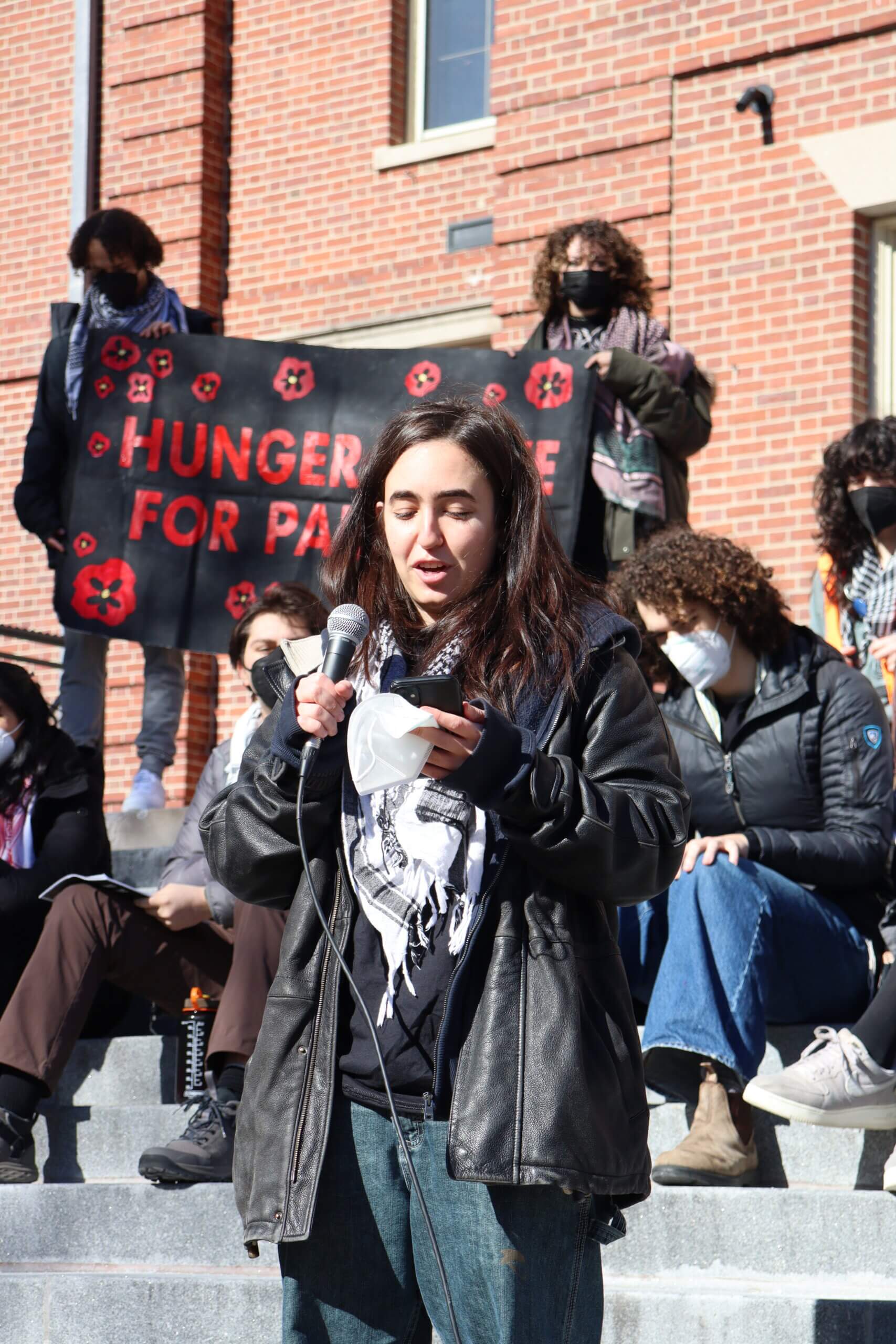
What makes the cause of university divestment so important to both of you?
AR: Universities have historically played a really important role in creating civil society pressure. And we see our hunger strike at Brown, very much in lineage with the hunger strike that happened at Brown for divestment from South Africa.
We know that our university is in conversation with the world, that Brown has an impact on the world, and we want it to withdraw material support from companies profiting off of occupation, apartheid and genocide.
I also want my university to be a just place, and I don’t want my institution of learning to be funding a genocide.
NA: What attracted me to Brown was their mission statement and their vision and all of these amazing things about education and the wellbeing of the community. We really want them to be invested in things that they say that they are aligned with.
You brought up when there was a hunger strike over apartheid South Africa in 1986 at Brown. Are either of you concerned about being partially disenrolled, as Brown did to four hunger strikers then?
AR: It’s definitely something we’ve talked about. Going into these sort of acts of protest, we want to be aware of all the risks. We want to be hopeful that our university will learn from its mistakes and make a different choice.
What is the general feeling among the group of you that are conducting this hunger strike — how are you all supporting each other?
NA: I don’t want to use this word, but I feel like we’re being bombarded with so much love and support by everyone. I think everyone is taking care of each other. Seeing everybody come together to support one another has been so absolutely amazing that you kind of forget that you’re on a hunger strike. You forget that you’re hungry. Because everyone is just feeding you love.
Us hunger strikers are checking in on each other multiple times a day, making sure that everybody is feeling really loved and cared for.
AR: It’s like a chorus of little birds. When you walk into our hunger striking room, everyone is like: “How are you? Are you okay?” “I’m tired, my head hurts, and how are you?” It’s constantly supportive. It’s not as if it’s just the 19 of us hunger striking, there’s a whole apparatus to not only directly help us, but also professors who are doing teach-ins, film screenings, rallies, artmaking, all going on around us all the time.
This might be a very basic question, but are either of you scared?
NA: I don’t think anything can scare me anymore. Every time I get scared, I just remember what’s happening. This is really nothing. This is the least that we can do. And I think it’s really, really important work, and I’m so proud of everyone. We’re also doing a great job to kind of validate everybody, and make sure that if somebody is feeling scared, we can talk about it.
AR: I have to do anything that I can because the situation in Palestine is so dire and has been for so many years. I do feel hunger in my body. But it’s worth it, and I don’t feel afraid.
I’m curious what your families’ reaction to you participating in the hunger strike has been like.
AR: I’ve been doing Palestine solidarity organizing for a long time. And so I think that my family and I have grown past the point of extreme conflict, which is not to say that there never was — and there still is, at times — but right now we’re good. They’re just worried about my health.
When I was arrested, and also just like, throughout my life of doing solidarity work, I have gotten a lot of really harsh words from members of my community, calling me a kapo, saying, “You are a traitor to your people,” or like, “You are stupid.” I have gotten varying levels of that from family, from people that I’ve grown up with, and from members of the Brown community who feel that way about me and the other 150 members of Jews for CeaseFire Now.
NA: My parents are very supportive. Palestinians have a history of hunger striking.
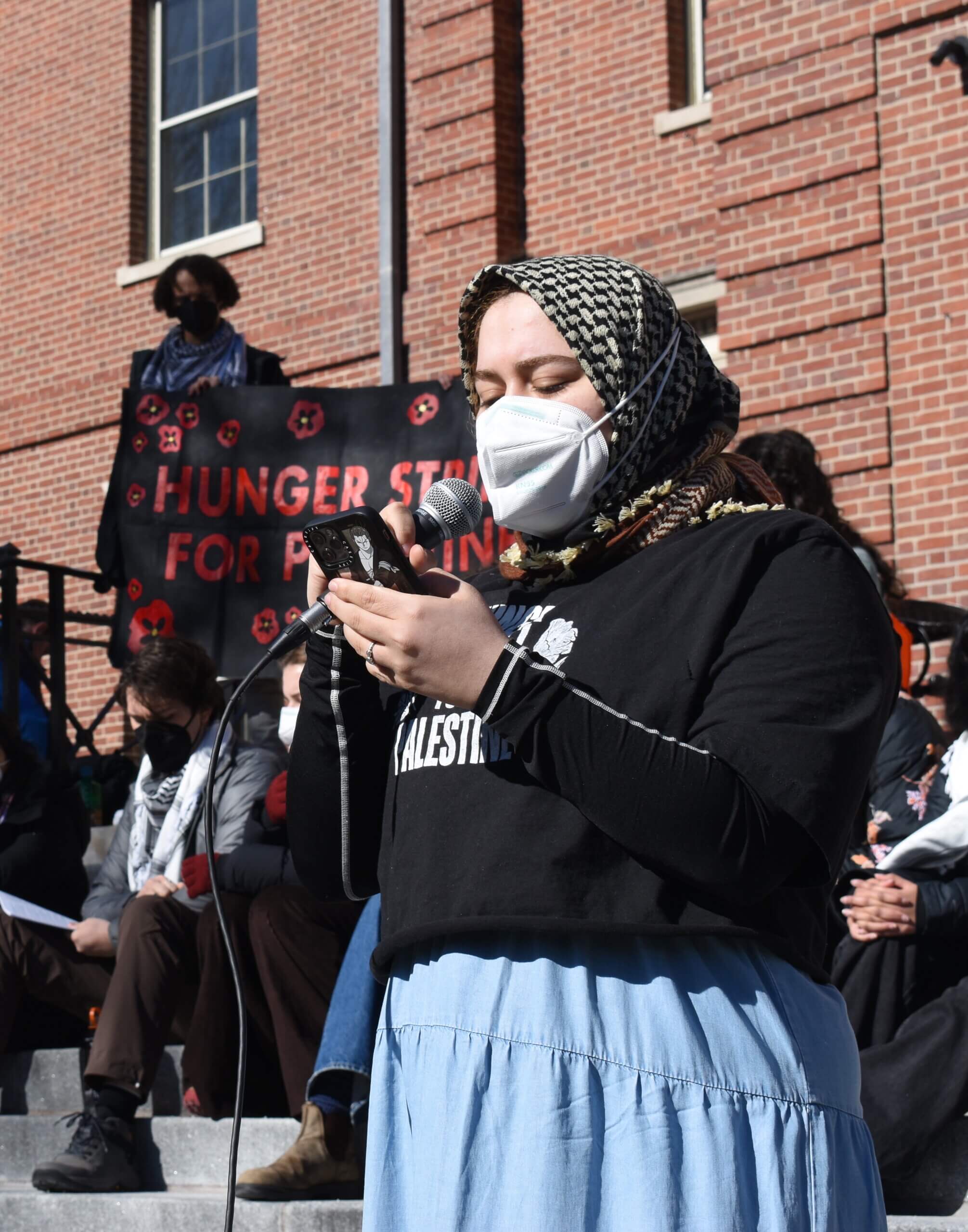
Is there someone that comes to mind in particular that you imagine you’re doing this for?
AR: I spoke earlier today at a rally about my family history, and the experience of my grandparents fleeing Poland during the Holocaust to Mandatory Palestine, and being among the first citizens of the State of Israel … I don’t think that the cycle of violence that was perpetrated against my family had to be repeated. If I feel particularly bad, I sort of think about this is my moment of intervention, doing what I think is right, and hopefully making making a dent.
NA: Right now, I think about the people in Gaza. And it kind of spiraled me into thinking more broadly about indigenous people everywhere that face all of these brutalities and injustices. I think I’m more thinking of it as everybody is my family, and I’m doing this now for a people who are oppressed.
Have you all discussed what you think that you would do if the university ultimately doesn’t give in to your demand to consider a divestment?
AR: I think we’re just hoping that they do, and we feel like they have to, and that’s all we got.
NA: They have to.
AR: I really want to hammer home that there’s massive support in the student body for divestment, and that we’ve gone through all of the official channels and are still being rejected unjustly at every turn. And that our demand is not even that they should pass divestment, but that they should hear it. And yet, they’re still allowing us to continue our hunger strike. We’re on our fourth day, and we’re prepared to keep going.
NA: It’s extremely disappointing. We are following all the rules, there’s no reason to keep rejecting to even hear our demands. I really, really, really, really hope that they hear us.
Editor’s note: The original version of this article misstated Ariela Rosenzweig’s number of arrests as two. She was only arrested once at the November protest. It also misstated the date of Hisham Awartani’s shooting as prior to the November protest. He was shot and paralyzed after the November protest and prior to the December protest.











